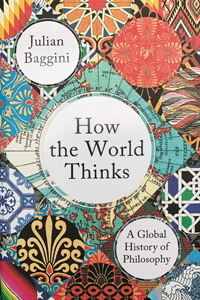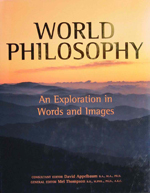The wisdom of the East...
 ‘How do I make sense of the world?’ and ‘How do I make sense of my life?’ must be the two most basic and important questions anyone can ask. They have led, in different ways, to the development of philosophy, religion, science and psychology.
‘How do I make sense of the world?’ and ‘How do I make sense of my life?’ must be the two most basic and important questions anyone can ask. They have led, in different ways, to the development of philosophy, religion, science and psychology.
However, those of us brought up in the West can all too easily slip into the common assumption that philosophy deals only with the validity of arguments, science with matters of fact, religion with personal views and commitments and psychology with the internal workings of the mind. But such compartmentalisation has never been satisfactory – what we understand, how we feel and the commitments and moral views we hold, all influence one another. It is therefore wonderfully refreshing to turn to the various Eastern philosophies and enter into a world where the view of human life and its meaning is more holistic.
When I first encountered Eastern philosophy, I found it liberating to explore answers to the questions of life that were quite different from those with which I had grown up, and a fascination with Eastern thought, particularly Buddhism, has stayed with me. There is enormous benefit to be gained from even a brief survey of the traditions of wisdom and insight that have come from the East.
Mel Thompson

... a symbol of enlightenment, the opening out of the mind.
Understand Eastern Philosophy
This book explores the traditions of thought and wisdom that developed in the Indian sub-continent and the Far East:
-
From India, you have the wealth of ideas, mental disciplines, religious and social practices that are collectively known as Hinduism, along with the Jain and Buddhist philosophies that developed within Hindu culture but were critical of Hindu orthodoxy and therefore emerged as separate traditions.
- From the Far East, you have the ancient traditions of Confucianism and Taoism, later blending with Buddhism to form the rich mixture of Chinese thought.
It also examines two wisdom traditions that are very different in approach - Tantra and Zen - the one based on ritual action and the creative use of the imagination, the other with an intuition of reality that goes beyond concepts.
Together, these traditions have a history that stretches back three thousand years, and have contributed vastly, not just to the eastern cultures, but globally. A book such as this can do no more than point to the central themes and issues that Eastern Philosophy has addressed, and to outline its main approaches and conclusions.
Hinduism, Buddhism, Jainism, Confucianism and Taoism
These traditions can be considered both as religions and as philosophies.
Whereas that distinction does not really hold for these Eastern traditions, for practical purposes most books on Eastern Philosophy explore the ideas of each tradition but their ethical implications, details of cermonies and lifestyle are generally mentioned only in passing.
If you are approaching this subject from a Religious Studies perspective, you may therefore want to supplement the philosophy with books on the distinctively religious aspects in order to get a balanced view.
An extract from the Introduction…
Those who are accustomed to modern Western philosophy may be in for a shock as they move eastwards. In the West, both the content and the methods used in philosophy have become carefully defined. Some areas of enquiry that were once seen as branches of philosophy have been divided off as separate subjects (e.g. natural philosophy has become ‘science’). As a result, philosophy has become a discipline without a subject matter of its own; its task being limited to a critical examination of the presuppositions, arguments and language used within other disciplines.
In the West, one does not expect someone versed in the philosophy of mind to work in a psychiatric unit, nor a philosopher of science to be undertaking fundamental research, nor a philosopher of religion to be necessarily practising a particular religion or teaching meditation techniques. Philosophers stand back, look and comment - their quest is generally for truth in the sense of clarity, less often for truth in the form of experience or action. But this has not always been the case. For much of its history, Western philosophy has been broadly based, and it was only really with the rise of modern science that philosophy handed over much of what it had previously considered its subject matter to the emerging scientific disciplines. Nor may it always be the case; recently, popular philosophy in the West has broadened its range of interests to explore existential questions about life and its meaning, many aspects of our cultural life and also the therapeutic potential of ideas. The narrow, academic view of Western philosophy is therefore not the whole story, but it does highlight a general contrast between East and West.
Moving East, the situation is very different. Philosophy has not limited itself to rational argument, nor has it separated itself from those areas in life through which fundamental questions are asked. Hinduism, Buddhism, Jainism, Confucianism, Taoism: these are religious and social systems as well as philosophies. Zen and Tantra are explorations of meditation and the power of emotions and sexuality respectively. Such systems have practical and physical consequences: they make a difference to people's lives. But they are also philosophies, in that their religious, social and moral teachings are based on, and give expression to, fundamental views about the nature of reality. So the Wisdom of the East is philosophy and psychology and sociology and religion all rolled into one. Or, to be more accurate, it is a wisdom that does not require its insights to be compartmentalised in the traditional Western way.
'Understand Eastern Philosophy' has 'Western' sections throughout the text, showing parallels with Western thought, as here in describing the Tao...
According to Taoist philosophy, rest is prior to motion, and stillness is prior to action; therefore the Tao is basic to everything. The Tao, although motionless in itself, offers the basis for all other movement. In this sense, the Tao is that which is absolutely natural.
Western:
Here we have a parallel with the unmoved mover and uncaused cause of Aristotle and Aquinas. The Tao acts as exactly the unmoved and uncaused basis of everything. The only crucial difference is that whereas Western thinkers went on to say that this uncaused cause was 'God' and therefore set over against created things, within Taoism (and other eastern philosophies) the source of life is not set over against individual beings, but is their true nature. Becoming aware of the Tao is also to become aware of oneself, just as for Mahayana Buddhists there is awareness of one's own Buddha nature. The Western equivalent of this is panentheism (God in everything, but not simply to be identified with everything, which would be pantheism).
Even then, it is important to recognise that Tao is not something that can be grasped with the intellect (that was the essential thing to recognise in that opening sentence of the Tao Te Ching). One may become aware of it, but not define it.
 Intellectual precision...
Intellectual precision...
Do not be fooled by mention of sacred texts, authoritative teachers, meditation or ritual into assuming that reason and evidence are neglected in Eastern thought. On the contrary, it is intellectually rigorous. You will find arguments and debates here that are as challenging as any in the history of Western thought.
'The life, religion and philosophies of the Indian sub-continent are expressed through an amazingly rich mixture of ideas, practices and social customs that have developed over more than three thousand years. There is no single Hindu religion or Hindu philosophy, but rather a variety of ways of understanding and relating to the world that are blended from a stock of widely held ideas, some more ancient than others.'
Please note...
Although the Buddhist traditions are included in Understand Eastern Philosophy, it has its own webpage. Click here to go to the Buddhism page.




